Dental Implants Cottonwood Heights
The Golden Standard for Tooth Replacement
Are missing teeth holding you back in life? Whether you’re missing one tooth, several, or an entire arch, there’s no doubting that tooth loss can have a negative impact on nearly every aspect of your life, from smiling confidently to staying healthy. While traditional tooth replacement options like dentures and dental bridges fill the gaps in your smile, without a root to hold them in place, they leave a lot to be desired in terms of stability and longevity. Thankfully, at White Peak Dental we offer the golden standard for tooth replacement: dental implants in Cottonwood Heights. This state-of-the-art tooth loss solution is the next best thing to natural teeth because it replaces both the roots and the crown of a missing tooth! Read on to learn more about dental implants and give us a call today to schedule your consultation.
Why Choose White Peak Dental for Dental Implants?
- Hansen Has Advanced Training in Implant Dentistry
- Entire Dental Implant Treatment Completed Under 1 Roof
- Dental Insurance Welcome & In-House Membership Available
What is a Dental Implant?
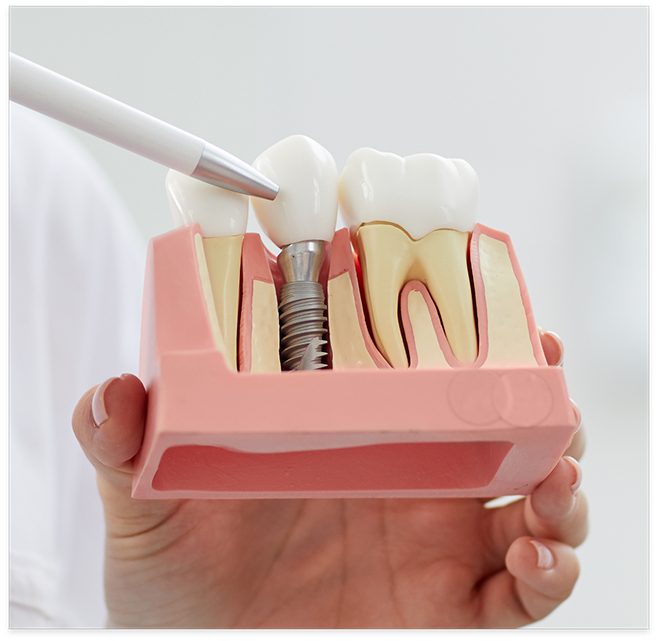
A dental implant looks like a small, screw-shaped post and is designed to be placed directly into the jawbone. Since they’re made of biocompatible materials like titanium, the implant gradually fuses with the surrounding bone tissue, allowing it to essentially become part of the jaw and replace the missing roots of the tooth! This strong foundation within your jaw sets dental implants apart from traditional options that only replace the visible portion of missing teeth. One or more dental implants can be placed anywhere in the mouth and can support restorations like crowns, bridges, or dentures to replace any number of missing teeth. The result is a smile that looks, feels, and functions just like natural!
The 4-Step Dental Implant Process

Many experts consider dental implants the ideal way to rebuild smiles after tooth loss because of their unique placement in your jaw. Unlike dentures and bridges, this involves surgically positioning support rods that eventually fuse with the bone material to become a more permanent part of your mouth.
At our office in Cottonwood Heights, Dr. Hansen has completed advanced training and has the state-of-the-art equipment to perform the entire procedure in the office for your convenience. Continue reading to learn more about what typically occurs during the implant process so you know what to expect!
Initial Dental Implant Consultation
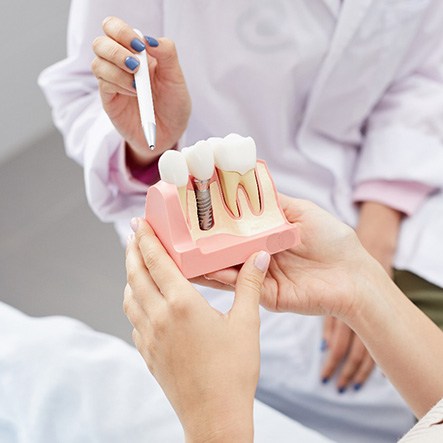
Potentially, anyone who has lost adult teeth can benefit from getting dental implants, but that doesn’t necessarily mean that they’re the best solution to meet everyone’s unique needs. Before Dr. Hansen can approve your procedure, you must have an initial consultation and examination to ensure that your mouth is healthy enough to support these replacements.
Our team will update your medical history and treat any pre-existing dental problems, such as cavities or gum disease, that could negatively affect the outcome. We’ll also take X-rays or other images and scans to measure your jawbone density to determine whether it’s thick enough to serve as a foundation for your new teeth.
Dental Implant Surgery
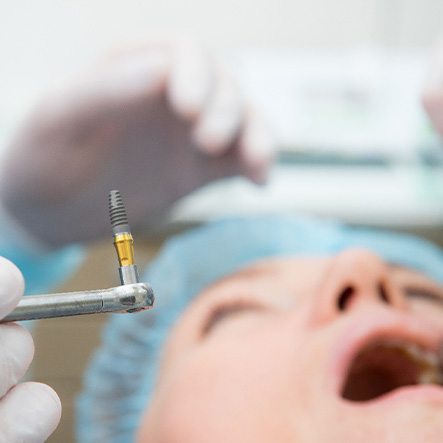
Dr. Hansen proudly provides each step of the dental implant process, including your oral surgery, under one roof to streamline your experience. Our team will start your procedure by numbing and/or sedating you to help you feel calm and comfortable throughout. Then, we’ll make a small incision in your connective tissues to strategically position the implant post into your jaw.
Then, we’ll close your gums and place a protective cap over this support rod to protect it from harm while the tissues recover.
Dental Implant Osseointegration & Abutment
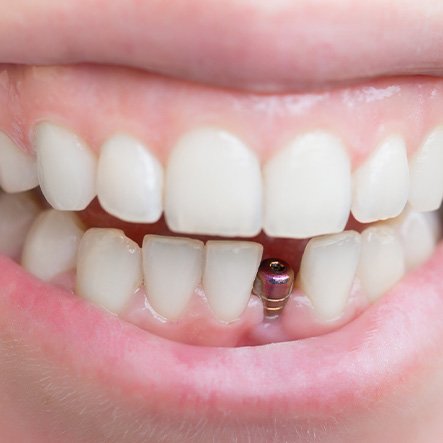
It can take three to six months to recover from surgery because your mouth must generate enough new bone growth to fuse with your implant(s) in a process called osseointegration. Once your gums have healed sufficiently, Dr. Hansen can take impressions of your mouth to create your customized prosthetics, depending on how many replacements are required.
Then, you’ll have a second, more minor procedure to attach the abutment, or connector piece, to your implant. This will eventually anchor your restoration to close the gap(s) in your grin.
Delivery of Dental Implant Restoration(s)

Our team sends your information to a dental laboratory that designs your new teeth, which can sometimes take a couple of weeks. Once your restoration is delivered, we’ll schedule a fitting with you to ensure it functions as intended. If everything checks out okay, we’ll cement it in place and send you home with a beautifully rebuilt smile!
The Benefits of Dental Implants

- No slipping, sliding, or popping out of place at embarrassing times
- Enjoy 80% or more restored biting power and eat all your favorite foods once again
- Care for easily with regular brushing, flossing, and checkups
- Maintain your jawbone strength and prevent the aged look that often comes with tooth loss
- Beautiful, natural-looking results that have the potential to last a lifetime
Who Dental Implants Can Help

No matter how many teeth you’re missing, dental implants can help. First, we’ll make sure that you’re a good candidate for dental implants by checking for good overall health, great oral health, and adequate jawbone density. Once you’ve completed any necessary preliminary treatments like a bone graft or gum disease treatment, we’ll help you determine how many dental implants you need.
Missing Single Tooth

As you may imagine, one missing tooth can be replaced with a single dental implant topped with a crown. A single-tooth dental implant in Cottonwood Heights will fit in perfectly between your remaining healthy teeth without altering them like a traditional dental bridge would.
Missing Multiple Teeth
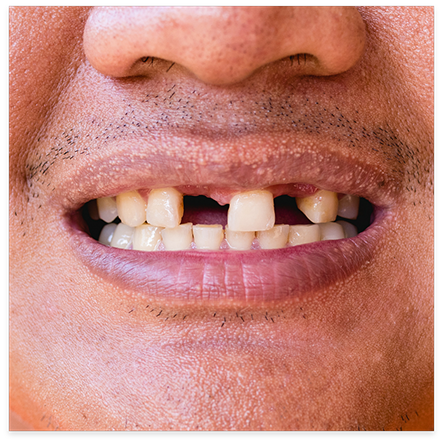
For several missing teeth in a row, an implant bridge can be utilized. However, instead of relying on the teeth on each side of the gap, this restoration is supported by a pair of dental implants. For multiple missing teeth throughout the mouth, several dental implants can hold a partial denture in place.
Missing All Teeth
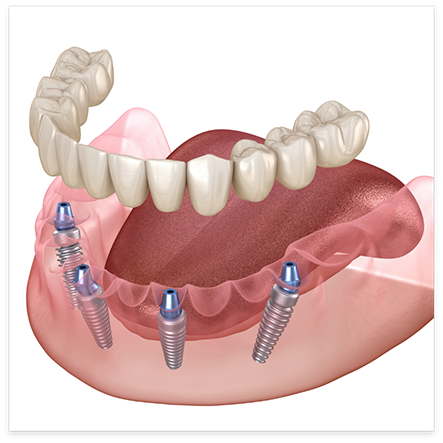
If you’re missing all your teeth, traditional dentures aren’t your only option for a complete smile. With just a few strategically placed dental implants, we can anchor an implant denture into place. This type of denture won’t slip out of place and will easily chew foods that you may find challenging with traditional dentures.
Advanced Dental Implant Procedures

The dental implant procedure in Cottonwood Heights is not always straightforward. While some patients can get their implants placed soon after their initial consultation, others must first undergo some preliminary treatments. Although these advanced services can add to your overall treatment timeline, they are both worthwhile and necessary. They can play a vital role in the ultimate success of your restored smile.
Below, you can learn about a few of the advanced implant procedures available at White Peak Dental. Rest assured that whichever treatments you must undergo, our team will do all we can to make you comfortable during your time in our office. If you have questions about any of the services we offer, feel free to reach out to us.
Bone Grafts
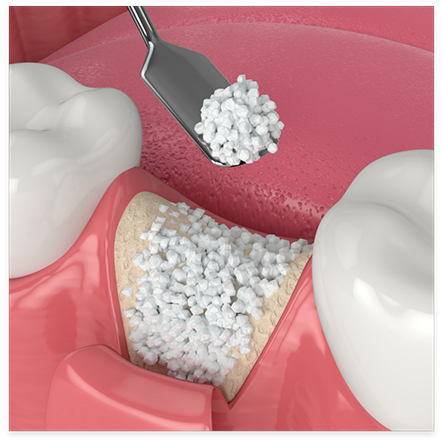
After the natural teeth go missing, a process known as resorption begins. Basically, this means that your body recycles the raw bone material in your jaw because it is no longer needed to support your teeth. Eventually, resorption can reach the point where the bone is so thin or small that it is not capable of supporting dental implants.
To address this issue, we may have to perform bone grafting in Cottonwood Heights. There are several different types of bone grafts, but they all have the same goal: They aim to build up the jawbone, fortifying and enlarging it so it can form a strong, secure bond with dental implants. Here are some key notes about bone grafts:
- The grafted material may be your own bone, an artificial substance, or bone from another source.
- In some cases, granulated bone is used to build up the jaw. In other cases, a block of bone is used.
- Typically, there is a healing period of several months after a bone graft before dental implants can be placed. However, in some instances, we can perform a bone graft and dental implant placement during the same surgical session.
Ridge Expansion
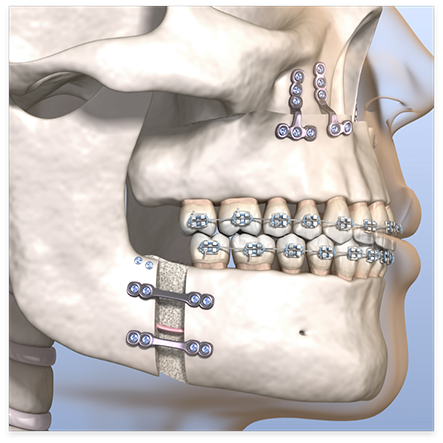
We often say that we place dental implants in the jawbone. However, that is a broad generalization of what actually happens. In reality, the dental implants are placed into the alveolar ridge, which is the ridge-like portion of the jawbone that normally supports the teeth.
In some cases, due to resorption or other factors, the alveolar ridge is too narrow to support dental implants. We address this issue with a surgery known as ridge expansion, also called alveolar ridge augmentation. During the procedure, we use special instruments to wedge the ridge apart. Then, we place a bone graft between the sections of the ridge to widen it.
Sometimes, we can place dental implants in Cottonwood Heights at the same time that we perform ridge expansion. Often, though, a patient must wait several months so the grafted material has a chance to be integrated into the surrounding tissue.
Understanding the Cost of Dental Implants

Dental implants are a highly customized treatment, so it can be difficult to predict the price before we see you for a consultation. Many different factors go into the price of dental implants in Cottonwood Heights. We’ll provide an estimate during your consultation and go over all the associated costs, as well as all your payment options such as dental insurance. In the meantime, here are some things for you to keep in mind.
Preliminary Treatments & Dental Implant Surgery

Any preliminary treatments that you require before you can get dental implants, including gum disease therapy, tooth extractions, and bone grafting, will contribute to the overall cost. For many patients, these treatments are necessary to ensure that the dental implants are successful. Preliminary treatments are sometimes covered by dental insurance so this is something you should check with your insurance provider. Since we conveniently provide the entire treatment under one roof, you don’t need to worry about working with an outside surgeon and needing to pay for the implant placement separately.
The Parts of Your Dental Implant
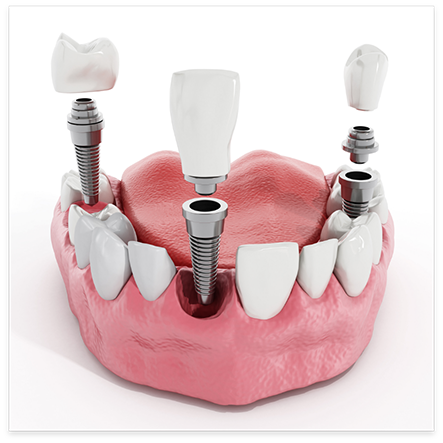
Here are the main factors that will affect the cost of your dental implants:
- Number of dental implants: Depending on the number of teeth you need to have replaced and where they are located in the mouth, you will need more or fewer implants. The more implants that you need, the higher the cost will be.
- Type of restoration: Crowns, bridges, and dentures all have different costs. Generally, the smaller the restoration, the more affordable it is.
- Materials Used: Implants can be made out of zirconia or titanium. These materials are at different price points.
- Brand of dental implant: Dental implants come from many different manufacturers. This can influence their cost.
How Dental Implants Can Save You Money

It can be tempting for patients to try to save money by opting for dentures or bridges, but dental implants have benefits that you can’t get from any other tooth replacement option. They can even help you save money in the long run. You won’t need to worry about paying for replacements every 5 to 7 years like you would with dentures, and there’s no need to stock up on adhesives or soaking solutions either. They can also help you avoid oral health issues, like gum disease, misalignment issues, and tooth decay, that require costly treatments over time.
Does My Dental Insurance Cover Dental Implants?

A lot of the time, dental insurance plans don’t cover the cost of dental implants, but there are some exceptions. Parts of the final or preliminary treatments are often covered. Our team will gladly go over your benefits with you so that you know exactly what is and isn’t covered before your treatment begins. We will do everything we can to help maximize your coverage.
Making Dental Implants Affordable

If you don’t have dental insurance, you aren’t necessarily left completely on your own. We have an in-office membership plan to help uninsured patients receive quality dental care at a reduced and affordable cost. With the White Peak Membership Plan, you can enjoy numerous benefits, including no yearly maximums, deductibles, claim forms, pre-authorization requirements, or waiting periods! Talk to our friendly team to learn more.
Dental Implant FAQs
How Long Do Dental Implants Last?
The answer to this question depends on how well you care for your dental implants. For example, if you implement good oral hygiene best practices, like brushing your teeth twice a day, avoiding/quitting the use of tobacco products, and visiting your dentist twice a year for a dental checkup and cleaning, then your dental implants can last for 30+ years. Conversely, if you eat a high-sugar diet, neglect to care for your teeth at home, and practice unhealthy dental habits, like chewing on ice, their lifespan will be significantly shorter.
Does Getting Dental Implants Hurt?
It’s no secret that getting dental implants is an extensive process. Luckily, the first step is always the same: using a local anesthetic. As a result, you will be completely comfortable during the procedure. During the healing process, it’s natural to experience some irritation and soreness. Don’t worry – that’s where cold compresses and over-the-counter pain relievers come in. Tools like this help ensure your recovery is as smooth and pain-free as possible.
What Should I Do If My Dental Implant Feels Loose?
Dental implants are inserted directly into the jawbone, providing unmatched stability. If they feel loose, then it may be a sign of failure. Therefore, priority number one is to get in touch with our implant dentist in Cottonwood Heights.
Will People Be Able to Tell That I Have Dental Implants?
Dental implants are lifelike in both look and function. While the restorations are custom-made and available in a wide range of enamel-colored shades, the implant post is inserted directly into your jawbone. As a result, its stability is unmatched. In short, complete personalization, natural look, and supreme function will ensure that even your closest loved ones will have a hard time telling the difference!
Do Dental Implants Decay?
Since dental implants are not made of enamel, they do not decay. The surrounding teeth, however, certainly can. Furthermore, the gums that support your dental implants can become infected if not cared for properly. So, dental hygiene is still more important than ever. For this reason, be sure to brush twice a day, floss daily, rinse with mouthwash regularly, and visit our team twice a year for a dental checkup and cleaning.
